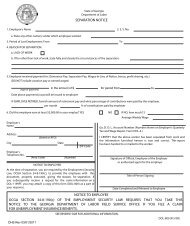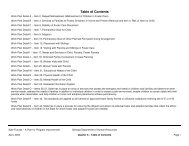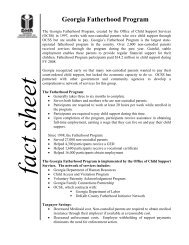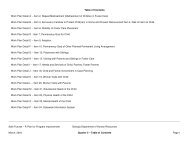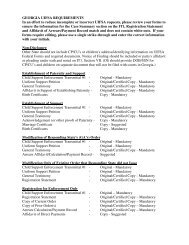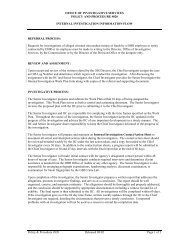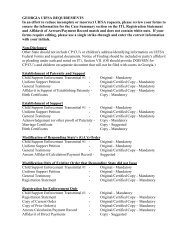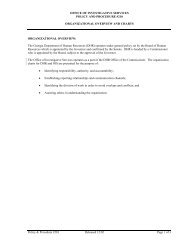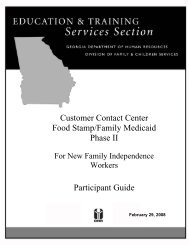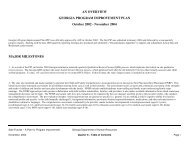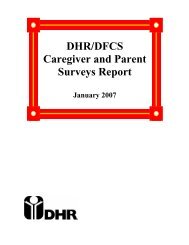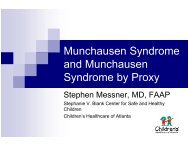CLAIMS HANDBOOK - Department of Human Services
CLAIMS HANDBOOK - Department of Human Services
CLAIMS HANDBOOK - Department of Human Services
You also want an ePaper? Increase the reach of your titles
YUMPU automatically turns print PDFs into web optimized ePapers that Google loves.
BENEFIT RECOVERY (<strong>CLAIMS</strong>) <strong>HANDBOOK</strong><br />
Notice <strong>of</strong> Intent to Intercept (1056)<br />
A notice is mailed to a household when the debt reaches TOP delinquency (no payment for<br />
180 days after the claim becomes delinquent). The debtor is notified <strong>of</strong> the intent to<br />
intercept federal benefits and given a deadline <strong>of</strong> 60 days to dispute the intercept or make<br />
other arrangements to pay the balance due. The claims manager must review Report<br />
DMJ5803I monthly to verify the validity, liability, delinquency, and the balance <strong>of</strong> the claim<br />
within 60 days <strong>of</strong> customer’s receipt <strong>of</strong> notice to prevent invalid or uncollectable claims<br />
being submitted to TOP. All other inquiries from the debtor should be referred to the<br />
Claims/Collections Unit. Refer to Pgs 28 and 50 for additional information.<br />
Notice <strong>of</strong> Federal Intercept (0057)<br />
A notice is mailed to the household when the intercept is posted or when rejected and a<br />
refund is indicated. A list <strong>of</strong> customers notified <strong>of</strong> a refund is manually reviewed by<br />
Claims/Collections Unit staff. Refunds may not occur if sufficient evidence is available to<br />
retain the payment. If the refund is manually overridden, the intercepted amount will be<br />
posted and a separate manual letter mailed by the Claims/Collections Unit to the customer.<br />
THE OFFICE OF PROGRAM INTEGRITY AND COMPLIANCE (OPIC)<br />
The Office <strong>of</strong> Program Integrity and Compliance (OPIC) is responsible for determining<br />
whether a recipient has committed an intentional program violation (IPV) by receiving or<br />
using benefits fraudulently, including suspicion <strong>of</strong> continued misuse and trafficking. An<br />
initial suspicion <strong>of</strong> misuse must be documented and the customer counseled. Subsequent<br />
acts <strong>of</strong> misuse must be referred. OPIC investigates those cases referred by DFCS on<br />
Form 5667. The case manager decides if a potential claim should be processed as<br />
inadvertent household error (IHE) or referred to OPIC for investigation.<br />
An IPV is an intentional action by an individual to establish or maintain an AU’s eligibility, or<br />
to increase or prevent a decrease in the AU’s benefits, by providing false or misleading<br />
information or withholding facts.<br />
Consider the following points to determine if a referral to OPIC is appropriate:<br />
• There should be a fraudulent misrepresentation in such form as to be a statement <strong>of</strong><br />
fact<br />
• The fact misrepresented must be material or relevant to the program requirements –<br />
result in incorrect benefits being issued.<br />
• The representation must be untrue, and the party making the representation must<br />
know or believe it to be untrue, and to make it with a reckless disregard for its<br />
truthfulness or falsity.<br />
Additionally, OPIC must be able to prove intent. All forms explaining the customer’s rights<br />
and responsibilities must by signed by both the customer and the case manager, and the<br />
case record available.<br />
Rev December ‘10 18



